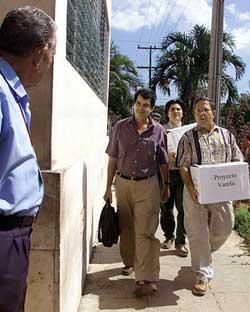|
|||||||
In the letter addressed to Ricardo Alarcón, the Assembly president, organizers of the three-year effort known as Proyecto Varela, or the Varela Project, admonished security forces for allegedly stealing signatures and detaining or intimidating those who have given their support.
Thousands of signatures -- beyond the 11,020 -- had to be nullified because ''institutions such as state security have harassed, detained, threatened or followed those citizens who have participated in this legal measure,'' the letter states, in part. ``We demand . . . the government to publicly explain that this citizen's petition drive is a constitutional right and any attempt to impede that right is a crime.''
The letter also requests a meeting with government officials and access to state-controlled media outlets for exposure of the Varela Project.
The delivery of the signatures comes just two days before the arrival of former President Jimmy Carter to Havana.
Carter, who will spend five days in Cuba meeting with President Fidel Castro and other high-ranking officials, has been urged by Varela Project supporters in the United States to discuss the effort during a televised speech scheduled for Tuesday.
TIMING APPLAUDED
Many Cuban-American activists here applauded the effort and called the timing a brilliant move.
''The fact that you have thousands of Cubans willing to put their names on a piece of paper to request change is a major shift in the internal dynamics of Cuba,'' said Frank Calzon, of the Washington-based Center for a Free Cuba.
Others said that while the effort was noble, it lacked the strength to bring about sweeping reform.
''By trying to change some parts of the constitution, they are implicitly accepting the control of the communist government and that is a big mistake,'' said Luis Zuñiga of the Cuban Liberty Council in Miami.
FIVE ISSUES
The Varela Project, named after a 19th century Cuban priest who advocated basic freedoms, calls on the National Assembly to convene a referendum on five points:
• Freedom of expression and association
• Amnesty for political prisoners who have not taken part in violent acts
• Free enterprise
• Electoral reform
• Elections within one year, if the referendum is approved by voters.
Although more signatures than required already have been gathered, organizers of the Varela Project plan to continue their campaign in case more names have to be turned in before the National Assembly convenes in mid-June.
''This process is not going to stop, it's just the first step,'' Héctor Palacios, of the Democratic Solidarity Party, said in a telephone interview.
''This initiative shows that Cubans have lost their fear to solicit change,'' said Palacios, 58. ``The government used to control the people. Now the people of Cuba are demanding to have control.''
The 11,020 signatures, which took a year to gather, are accompanied by addresses and national identity numbers. Volunteers fanned out across the country to verify all of the names, organizers said.
The Varela Project has been recognized internationally as the largest peaceful grassroots campaign since Castro rose to power in 1959.
''In Cuba, change for all rights will only be achieved if the majority of Cubans decide to conquer them peacefully, '' campaign coordinator Oswaldo Payá Sardiñas said in a written statement. ``We are asking that the Cuban people be given a voice . . . so that the sovereign people are the ones who decide to initiate changes for the good of our nation.''
'This is not a project of the opposition, but a citizens' project to attain the rights of all Cubans,'' Payá said.
Payá, of the Christian Liberation Movement, was accompanied by Antonio Villa Sánchez and Andrés Regis Iglesias, when he arrived at the National Assembly in Havana about 11 a.m. carrying two white boxes, labeled ``Citizen Petition.''
WITH RESPECT
Two uniformed guards let them inside, where they handed the documents to a female government official.
Villa Sanchez said by telephone that they were treated with respect at the offices of the National Assembly. Heightened security around the house that has served as headquarters for the Varela Project gave them the impetus to move forward.
''Police pressure over the past several days gave us the resolve to turn in those signatures with valor,'' said Villa Sanchez, 39. ``We know that what we are doing is legal. Now it's up to the government to take the next step.''
